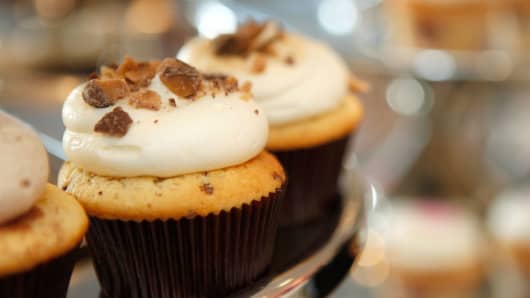Don't worry, you have not eaten your last cupcake.
Although Wall Street has declared the crash of the cupcake, it's not over on Main Street. What is waning is the over-marketed, mass-produced, lesser-quality cupcakes that helped saturate the market and cooked-up some eye-rolling gimmicks, food trend experts say.
"No more meatloaf cupcakes," pleaded chef Melissa Trimmer, the lead pastry chef instructor at Le Cordon Bleu Chicago.
Many argue that the crashing of Crumbs stock price is not a bellwether for the entire cupcake market, especially small, quality bakeries that make more than one product.
Crumbs Bake Shop, which makes cupcakes and colossal cupcakes, closed Monday at $1.29 on Nasdaq. When it started trading in June 2011, its price climbed as high as $13.30 per share, with a market value of $58.9 million.
Maybe early investors should have talked to Georgette Blau, president of On Location Tours, who said the cupcake frenzy was already dipping among the tourists flocking to her "Sex and the City" tours. The HBO show helped launch the craze years earlier with Magnolia Bakery as the lead beneficiary. Then, her tourists demanded their cupcakes come from Magnolia. Now: "They don't care," Blau said.
The decline started shortly after the release of "Sex and the City 2," Blau said. That was May 2010.
The $250 million cupcake market ranks high among the biggest snack trends of the past decade, according to Technomic, Inc., a research and consulting firm that specializes in the food industry. Cupcakes were the latest Krispy Kreme donut, (which are still big internationally) and frozen yogurt, (which had its first moment in the 1980s and is back now.)
The end of a trend is not a bad thing, according to even some of the cupcake fans.
"It kind of brought back the corner bakery," said Thomas Vaccaro, the dean of baking and pastry arts at Culinary Institute of America in Hyde Park, N.Y. "Now all of these bakeries are sustaining themselves."
The key, he said, is to make a good quality product and diversify. One of the legacies of the cupcake trend, he said, is that consumers are conditioned to look for an attractive, high-quality, sweet treat in a smaller portion size.
More From NBC News:
Study Says Rich Got Richer During the Recovery
World's 'Greenest' Office Building Opens in Seattle
Study: College-Educated Millennials Seek Work-Life Balance
"I saw a lot of consumers trying new things they wouldn't have tried before because they were in cupcake form," Vaccaro said.
Allison Robicelli is among the small bakers who got a giant boost from the cupcake craze but all along has offered other classic American desserts such as whoopee pies, brownies, cookies and pound cakes. Based in Brooklyn, the Robicelli's business she runs with her husband has grown more than 150 percent for each of the past five years, she said.
The cupcake backlash, she said, was mainly the fault of a sustained media frenzy and big corporate interests trying to apply a fast-food model.
While some small bakers such as Robicelli's are still growing, many smaller markets are seeing a cupcake boom. "There are still cities where cupcake shops are opening and doing quite well," said Mary Chapman, the director of product innovation at Technomic.
Indeed, while Crumbs and other cupcakeries are contracting in some markets, they are expanding in others.
"The current love of high-end cupcakes that began in urban markets on the East and West Coasts is now spreading across America. Malls present a new world of opportunity – in the past two weeks, we opened new locations in key malls in Cherry Hill, N.J. and Lancaster, PA," Julian R. Geiger, Crumbs president and CEO, said in a statement to TODAY.com.
As for the next trend, no one knows for certain, but just about everyone is willing to guess. Options thrown about include macarons, pie, chocolate-covered bacon, cream puffs, eclairs, churros, hot chocolate, Italian ices, Madeleines, waffles, soft pretzels and Financiers. Healthier (even if that means just in portion size,) gluten-free and vegan offerings are also on the rise.
And there are still some who see cupcakes as the next cupcake. "It's not really going away," said Stephen Zagor, the dean of culinary business and industry studies at the Institute of Culinary Education in New York City. "It's just sort of moderated."


